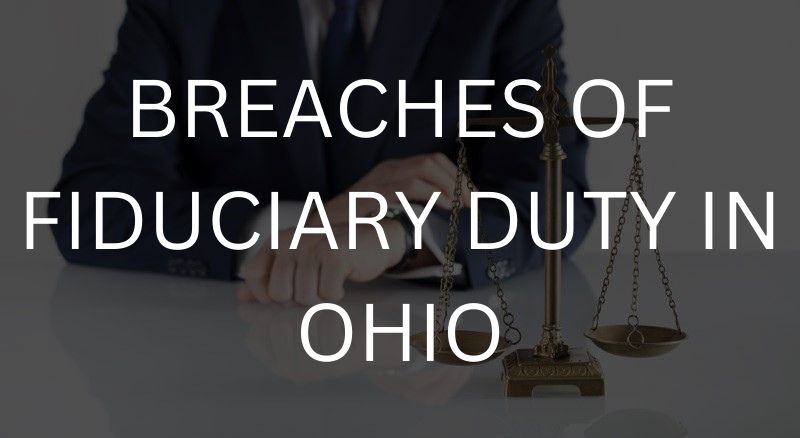Under Ohio law, a fiduciary relationship is established when someone has knowingly been placed in a position of trust or confidence to act for the benefit of one or more third parties. When such an obligation has been knowingly accepted, the responsible party has a legal responsibility to act solely in the best interest of others. In Ohio, this may include:
- Attorney and client relationship
- Guardian and ward relationship
- Employee and employer relationship
- Financial advisor and investor relationship
- Trustee and estate beneficiaries relationship
- Executor or administrator and estate beneficiaries relationship
- Relationship among business partners
A
breach of fiduciary duty occurs when the fiduciary fails to live up to the obligation to act in the best interests of the client, ward or beneficiary. These are complex cases, which are often difficult to prove. Contacting a Cleveland law firm with experience handling these types of relationships is vital to protecting your interests.
Related:
What Are the Legal Obligations of a Fiduciary in Ohio?

Breaches of Fiduciary Duty in Ohio
Under Ohio law, those who wish to prove a breach must prove that the accused knew they were acting in a fiduciary role, failed to act in the best interests of beneficiaries, and that person's actions or inactions resulted in damages. Common breaches of fiduciary duty include:
- Sharing trade secrets or insider information.
- Failing to follow directions or obligations.
- Improper use of accounts or funds.
- Acting against best interests.
- Failure to exercise reasonable care in carrying out duties.
- Self-dealing or profiting.
- Failure to share information regarding accounting, holdings or decision makings.
- Comingling personal and client/estate funds.
- Failure to comply with contractual obligations.
- Losses caused by wrongful acts.
- Losses caused by fraud, deceit or undue influence.
Why Choose McGowan Law?
The Law Offices of Daniel McGowan, LLC is a full-service law practice, with extensive experience in the areas of litigation and trial practice, elder law, and probate law and trust law. Daniel McGowan is well known for his experience with the probate process and Florida, Pennsylvania and Ohio and probate courts. He has a reputation for being accessible and for his thoughtful and innovative manner he solves probate problems and other civil disputes. Attorney McGowan is a member of the Association of Professional Responsibility Lawyers, and an active member of the Estate Planning Council of Cleveland and the Real Property, Probate, and Trust Law Section of the Florida Bar; the Elder Law Section of the Florida Bar, the Real Property, Trust and Probate Law Section of the American Bar Association; the Estate Planning, Trust and Probate Law Section of the Ohio State Bar Association; the Estate Planning, Trust and Probate Law Section of the Cleveland Metropolitan Bar Association and the Lawyers Guild of the Catholic Diocese of Cleveland and the Elder Law and Special Needs Section of the Ohio State Bar Association. The Law Offices of Daniel McGowan, LLC, represents clients in probate and estate matters throughout the Cleveland area, including Lakewood, Rocky River, Fairview Park, Shaker Heights, Cleveland Heights, South Euclid, East Cleveland, Linndale, Brooklyn, Parma, Brook Park. Newburgh Heights, Cuyahoga Heights, Brooklyn Heights, Warrensville Heights, Maple Heights, Garfield Heights, Bratenahl and Euclid.
Call 216-242-6054 today for a confidential consultation.


